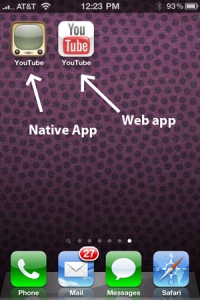Google is working hard on the Chrome Web Store where, if promises are kept, will be an app store filled with amazing web/mobile applications – that’s applications that work in the browser on your computer and mobile device. Google is planning to launch the Web Store this Fall and looks like they’ll be taking a mere 5% of the revenue from sales of apps (plus $5 just to keep out the crap). That’s right, developers get 95% of the take. After months of deliberating as to whether or not mobile apps will spell the end of native apps long-term I’m starting to be convinced.
My reasons:
1. YouTube proved it to me; showing that their HTML5 mobile web app performed better than the native iPhone app. Wow.
2. Google will make it easy to get apps that work across any smartphone with a browser (HTML5 supported)
3. The mobile web app market is larger than the native app market (i.e. it’s any phone with a supported browser)
4. Developers can make money across all platforms
5. Developing mobile web apps means largely using skills experienced web developers already (CSS, HTML, JavaScript, maybe AS3) vs. learning a new coding set for each platform
6. Developing for the browser is more open, and innovation will continue by the development community not reliant on a company
7. Companies can develop once and hit all smartphones, cutting down the development and support costs associated with multiple native apps
8. Consumers can take their apps with them to any smartphone and tablets
Of course, today mobile web apps might run slower than native apps due to their life in the cloud, and some device capabilities are not available to be applied to the browser but this is changing. Smartphones are increasing in horsepower with dual core smartphones not far off, and new development toolkits are allowing access to device-centric capabilities. Aside from the most ambitious of applications requiring deep device integration, as mobile web apps start to rival the features and functionality of native apps it makes sense that the benefits to developers, companies, and consumers will spell the beginning of the end for mobile walled gardens that we call app stores.




 Posted by Jaafer Haidar
Posted by Jaafer Haidar 


